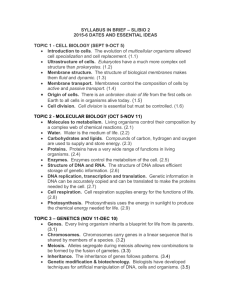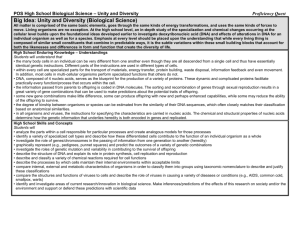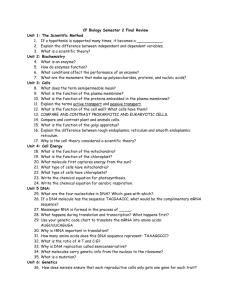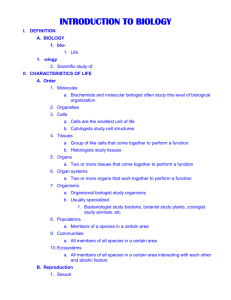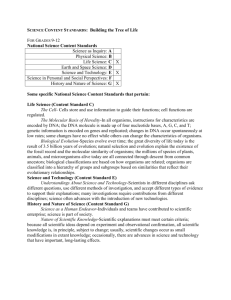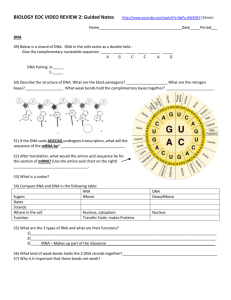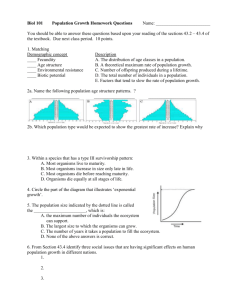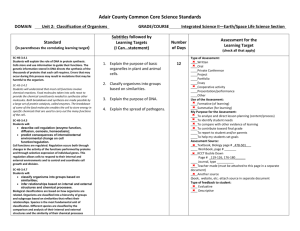Biology EOCT Practice Questions Part 2
advertisement
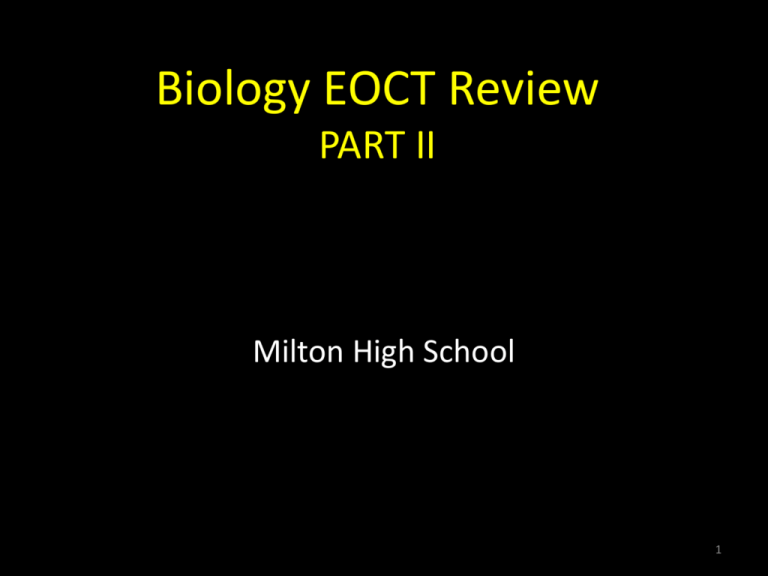
Biology EOCT Review PART II Milton High School 1 At a crime scene, detectives collected strands of hair and dusted surfaces to gather fingerprints. Forensic scientists compared the fingerprints using the computer database and analyzed the DNA in the hair. What characteristics of fingerprints and DNA help police solve the crime? A. Fingerprints and DNA can show the sex of the individual. B. Both DNA and fingerprints are unique to an individual. C. The state of fingerprints and DNA can show what time the crime occurred. D. Fingerprints and DNA tell whether the person is young or old. 2 At a crime scene, detectives collected strands of hair and dusted surfaces to gather fingerprints. Forensic scientists compared the fingerprints using the computer database and analyzed the DNA in the hair. What characteristics of fingerprints and DNA help police solve the crime? A. Fingerprints and DNA can show the sex of the individual. B. Both DNA and fingerprints are unique to an individual. C. The state of fingerprints and DNA can show what time the crime occurred. D. Fingerprints and DNA tell whether the person is young or old. 3 Without enzymes, the chemical reactions in living things A. Would happen at the same rate as they do with enzymes B. Would happen too rapidly to support cellular processes C. Would happen, only with different reactants D. Would happen too slowly to support cellular processes 4 Without enzymes, the chemical reactions in living things A. Would happen at the same rate as they do with enzymes B. Would happen too rapidly to support cellular processes C. Would happen, only with different reactants D. Would happen too slowly to support cellular processes 5 Which of the following is not a function of carbohydrates in cells? A. B. C. D. Energy sources Catalysts Structural materials Cellular identification 6 Which of the following is not a function of carbohydrates in cells? A. B. C. D. Energy sources Catalysts Structural materials Cellular identification 7 The function of nucleic acids is A. B. C. D. Assisting in chemical reactions in cells Storing and transmitting cellular information Storing energy for cells Providing structure to the nucleus of cells 8 The function of nucleic acids is A. B. C. D. Assisting in chemical reactions in cells Storing and transmitting cellular information Storing energy for cells Providing structure to the nucleus of cells 9 Which of the following helps plant cells remain rigid? A. B. C. D. Cell membrane Nucleus Chloroplast Central vacuole 10 Which of the following helps plant cells remain rigid? A. B. C. D. Cell membrane Nucleus Chloroplast Central vacuole 11 In what level is there the least energy available? A. Producers B. Primary consumer C. Secondary consumer D. Tertiary consumer 12 In what level is there the least energy available? A. Producers B. Primary consumer C. Secondary consumer D. Tertiary consumer 13 Which vital substance is produced by the mitochondrion? A. B. C. D. Protein DNA ATP Water 14 Which vital substance is produced by the mitochondrion? A. B. C. D. Protein DNA ATP Water 15 What type of cell is shown in the diagram? A. B. C. D. Eukaryotic cell Prokaryotic cell Viral cell Plant cell 16 What type of cell is shown in the diagram? A. B. C. D. Eukaryotic cell Prokaryotic cell Viral cell Plant cell 17 Which of the following is not a property of all living cells? A. B. C. D. Are composed of chemical elements Are the basic unit of function of living things Come from other cells Are indistinguishable from viruses 18 Which of the following is not a property of all living cells? A. B. C. D. Are composed of chemical elements Are the basic unit of function of living things Come from other cells Are indistinguishable from viruses 19 What is the main difference between cells in unicellular organisms and cells in in multi-cellular organisms? A. Cells in multi-cellular organisms are specialized to perform only certain tasks. B. Cells in unicellular organisms are organized into tissues and organs. C. Cells in unicellular organisms divide at a faster rate than cells in multi-cellular organisms. D. Cells in multi-cellular organisms contain only half of the genetic material as cells in unicellular organisms. 20 What is the main difference between cells in unicellular organisms and cells in in multi-cellular organisms? A. Cells in multi-cellular organisms are specialized to perform only certain tasks. B. Cells in unicellular organisms are organized into tissues and organs. C. Cells in unicellular organisms divide at a faster rate than cells in multi-cellular organisms. D. Cells in multi-cellular organisms contain only half of the genetic material as cells in unicellular organisms. 21 Which of the following does not describe a function of the cell membrane? A. Cell membranes maintain homeostasis by controlling the movement of substances into and out of the cell. B. The cell membrane contains many different proteins that enable a cell to detect and respond to its surroundings. C. The cell membrane participates in both active and passive transport. D. The cell membrane aids in both mitosis and meiosis. 22 Which of the following does not describe a function of the cell membrane? A. Cell membranes maintain homeostasis by controlling the movement of substances into and out of the cell. B. The cell membrane contains many different proteins that enable a cell to detect and respond to its surroundings. C. The cell membrane participates in both active and passive transport. D. The cell membrane aids in both mitosis and meiosis. 23 What cell structure identifies a cell as eukaryotic? A. B. C. D. Cell membrane DNA Nucleus Ribosome 24 What cell structure identifies a cell as eukaryotic? A. B. C. D. Cell membrane DNA Nucleus Ribosome 25 Speckled (Bb) Dark Brown (BB) Light Brown (bb) The population of crabs living on a sandy beach exhibits three colors: dark brown, light brown, and speckled. The genotypes of these colors are BB for dark brown, bb for light brown, and Bb for speckled. The speckled color blends in extremely well with the color of the sand on the beach. The pattern appears to provide the speckled crabs with some protection from predatory birds. Based on your knowledge of natural selection and the information above, which of the following conclusions can be drawn? A. Only the speckled crabs will survive and all of the offspring will be speckled. B. The allele for light brown color will be lost because of predatory birds eating light brown crabs. C. The allele for dark brown color will be lost because of predatory birds eating dark brown crabs. D. Both allele for dark brown and the allele for light brown will continue to be passed on in the crab population. 26 Speckled (Bb) Dark Brown (BB) Light Brown (bb) The population of crabs living on a sandy beach exhibits three colors: dark brown, light brown, and speckled. The genotypes of these colors are BB for dark brown, bb for light brown, and Bb for speckled. The speckled color blends in extremely well with the color of the sand on the beach. The pattern appears to provide the speckled crabs with some protection from predatory birds. Based on your knowledge of natural selection and the information above, which of the following conclusions can be drawn? A. Only the speckled crabs will survive and all of the offspring will be speckled. B. The allele for light brown color will be lost because of predatory birds eating light brown crabs. C. The allele for dark brown color will be lost because of predatory birds eating dark brown crabs. D. Both allele for dark brown and the allele for light brown will continue to be passed on in the crab population. 27 1 2 3 4 Meiosis allows for genetic variation of offspring because parental alleles can be combined in different ways. A Punnett square shows how parental alleles can combine. The Punnett square below shows a cross between two rabbits. Black fur (B) is dominant to brown fur (b). What would be the phenotype of the offspring indicated by Box 3? A. B. C. D. Brown Mixture of brown and black Black The phenotype cannot be determined. 28 1 2 3 4 Meiosis allows for genetic variation of offspring because parental alleles can be combined in different ways. A Punnett square shows how parental alleles can combine. The Punnett square below shows a cross between two rabbits. Black fur (B) is dominant to brown fur (b). What would be the phenotype of the offspring indicated by Box 3? A. B. C. D. Brown Mixture of brown and black Black The phenotype cannot be determined. 29 Variation within organisms within a species increases the chance that a species will survive changing conditions. What kind of reproduction produces the most variation within a species? A. Asexual reproduction B. Budding C. Parthenogenesis D. Sexual reproduction 30 Variation within organisms within a species increases the chance that a species will survive changing conditions. What kind of reproduction produces the most variation within a species? A. Asexual reproduction B. Budding C. Parthenogenesis D. Sexual reproduction 31 Which statement explains why approximately half of an individual’s DNA sequence comes from each parent? A. A cell from one parent undergoes meiosis, producing offspring cells that have both parents’ DNA. B. A cell from one parent undergoes mitotic cell division, producing offspring cells that have only half of the parent’s DNA. C. Cells in the parents undergo meiosis, producing haploid gametes that meet up during fertilization to produce a diploid individual. D. Cells that parents undergo mitosis, producing offspring cells that meet up during fertilization to produce an individual with half of each parent’s DNA. 32 Which statement explains why approximately half of an individual’s DNA sequence comes from each parent? A. A cell from one parent undergoes meiosis, producing offspring cells that have both parents’ DNA. B. A cell from one parent undergoes mitotic cell division, producing offspring cells that have only half of the parent’s DNA. C. Cells in the parents undergo meiosis, producing haploid gametes that meet up during fertilization to produce a diploid individual. D. Cells that parents undergo mitosis, producing offspring cells that meet up during fertilization to produce an individual with half of each parent’s DNA. 33 If a speckled crab (Bb) were crossed with another speckled crab (Bb), what are the chances that their offspring would have a heterozygous genotype? A. B. C. D. 0% 50% 75% 100% 34 If a speckled crab (Bb) were crossed with another speckled crab (Bb), what are the chances that their offspring would have a heterozygous genotype? A. B. C. D. 0% 50% 75% 100% 35 For a certain plant, purple flowers (P) are dominant, and white flowers (p) are recessive. A homozygous purple plant is crossed with a homozygous white plant. What are the possible genotypes of the offspring? A. pp only B. PP only C. Pp only D. PP, pp, and Pp 36 For a certain plant, purple flowers (P) are dominant, and white flowers (p) are recessive. A homozygous purple plant is crossed with a homozygous white plant. What are the possible genotypes of the offspring? A. pp only B. PP only C. Pp only D. PP, pp, and Pp 37 RNA is chemically similar to DNA except that it contains ribose instead of deoxyribose, and the base thymine is replaced by A. B. C. D. alanine adenine uracil cytosine 38 RNA is chemically similar to DNA except that it contains ribose instead of deoxyribose, and the base thymine is replaced by A. B. C. D. alanine adenine uracil cytosine 39 What is the major source of new alleles in natural populations? A. B. C. D. Mutations in somatic cells Mutations in sex cells Adaptations in individual organisms Trait selection by natural selection 40 What is the major source of new alleles in natural populations? A. B. C. D. Mutations in somatic cells Mutations in sex cells Adaptations in individual organisms Trait selection by natural selection 41 Carl Linnaeus’s system of classification was based on his judgment of the importance of various similarities among living things. Scientists have traditionally used similarities in appearance and structure to group organisms. However, this approach has proven problematic. Identify one way that this approach could be problematic. A. B. C. D. Some groups look different and are not related. Some groups look similar but are not closely related. Some groups look different but are related. There is not consistent relationship between structures and relatedness. 42 Carl Linnaeus’s system of classification was based on his judgment of the importance of various similarities among living things. Scientists have traditionally used similarities in appearance and structure to group organisms. However, this approach has proven problematic. Identify one way that this approach could be problematic. A. B. C. D. Some groups look different and are not related. Some groups look similar but are not closely related. Some groups look different but are related. There is not consistent relationship between structures and relatedness. 43 Jackrabbits live in warm environments in the southwestern United States. They have short hair and long ears that help them radiate heat. What would most likely happen to the jackrabbit population if the environment slowly began to cool? A. The jackrabbit population would migrate farther north. B. The jackrabbit population would definitely become extinct. C. The jackrabbit population would evolve to have longer, wider ears. D. The jackrabbit population would evolve to have thicker coat and hair. 44 Jackrabbits live in warm environments in the southwestern United States. They have short hair and long ears that help them radiate heat. What would most likely happen to the jackrabbit population if the environment slowly began to cool? A. The jackrabbit population would migrate farther north. B. The jackrabbit population would definitely become extinct. C. The jackrabbit population would evolve to have longer, wider ears. D. The jackrabbit population would evolve to have thicker coat and hair. 45 Which of the following statements identifies the characteristics of fungi? A. B. C. D. Fungi are heterotrophic, have cell walls, and have threadlike bodies. Fungi are autotrophic, have cell walls, and have threadlike bodies. Fungi are heterotrophic, lack cell walls, and have hollow bodies. Fungi are heterotrophic, lack cell walls, and have threadlike bodies. 46 Which of the following statements identifies the characteristics of fungi? A. B. C. D. Fungi are heterotrophic, have cell walls, and have threadlike bodies. Fungi are autotrophic, have cell walls, and have threadlike bodies. Fungi are heterotrophic, lack cell walls, and have hollow bodies. Fungi are heterotrophic, lack cell walls, and have threadlike bodies. 47 All protists A. B. C. D. Are parasites Move toward the light Have a true nucleus Use flagella to move 48 All protists A. B. C. D. Are parasites Move toward the light Have a true nucleus Use flagella to move 49 Which terrestrial biome is characterized by high precipitation, relatively infertile soil, heavily forested land, and high levels of biodiversity? A. B. C. D. Temperate deciduous forest Taiga Tropical rain forest Savanna 50 Which terrestrial biome is characterized by high precipitation, relatively infertile soil, heavily forested land, and high levels of biodiversity? A. B. C. D. Temperate deciduous forest Taiga Tropical rain forest Savanna 51 Enzymes are catalysts. What is the role of a catalyst? A. B. C. D. Provides extra energy for a reaction Lowers the activation energy of a reaction Eliminates the activation energy of a reaction Only allows irreversible reactions to happen 52 Enzymes are catalysts. What is the role of a catalyst? A. B. C. D. Provides extra energy for a reaction Lowers the activation energy of a reaction Eliminates the activation energy of a reaction Only allows irreversible reactions to happen 53 How are viruses different from living organisms? A. Viruses have not DNA or RNA B. Viruses use host cell parts to reproduce C. Viruses contain no proteins D. Viruses can be killed by antibiotics Influenza virus 54 How are viruses different from living organisms? A. Viruses have not DNA or RNA B. Viruses use host cell parts to reproduce C. Viruses contain no proteins D. Viruses can be killed by antibiotics Influenza virus 55 Water movement into and out of cells is of prime importance to all living things. The organism in the figure has star-shaped organelles called contractile vacuoles to move water from inside to outside the cell. How does water move into the organism? A. B. C. D. Through the cilia By osmosis By capillary action Through the mouth pore 56 Water movement into and out of cells is of prime importance to all living things. The organism in the figure has star-shaped organelles called contractile vacuoles to move water from inside to outside the cell. How does water move into the organism? A. B. C. D. Through the cilia By osmosis By capillary action Through the mouth pore 57 Modern classification systems A. Are based solely on structural characteristics of organisms B. Are based on evolutionary relationships as well as similar characteristics C. Are based on similar behaviors among organisms D. Are based solely on evolutionary relationships between organisms 58 Modern classification systems A. Are based solely on structural characteristics of organisms B. Are based on evolutionary relationships as well as similar characteristics C. Are based on similar behaviors among organisms D. Are based solely on evolutionary relationships between organisms 59 When significant climate change happens on Earth, which of the following is most likely? A. B. C. D. The destruction of Earth’s ecosystems Changes in Earth’s ecosystems A halt in the appearance of new species Overpopulation of bacteria 60 When significant climate change happens on Earth, which of the following is most likely? A. B. C. D. The destruction of Earth’s ecosystems Changes in Earth’s ecosystems A halt in the appearance of new species Overpopulation of bacteria 61 The role of chloroplasts in plant cells is to A. B. C. D. Store water and nutrients Support and protect the cell Use light energy to make carbohydrates Make proteins 62 The role of chloroplasts in plant cells is to A. B. C. D. Store water and nutrients Support and protect the cell Use light energy to make carbohydrates Make proteins 63 The single-celled organism above uses a whip-like flagellum to move. The organism has a nucleus and organelles surrounded by a membrane. The organism also has chloroplasts and a cell wall. To which kingdom does the organism belong? A. Animalia B. Eubacteria C. Plantae D. Protista 64 The single-celled organism above uses a whip-like flagellum to move. The organism has a nucleus and organelles surrounded by a membrane. The organism also has chloroplasts and a cell wall. To which kingdom does the organism belong? A. Animalia B. Eubacteria C. Plantae D. Protista 65 Why does the human body require carbohydrates, proteins, and lipids? A. The body uses these nutrients to synthesize inorganic compounds. B. The body uses these vitamins to synthesize and maintain bones and nerves. C. The body uses these nutrients to synthesize organic compounds and maintain life processes. D. The body uses these inorganic compounds to maintain life processes and reproduce. 66 Why does the human body require carbohydrates, proteins, and lipids? A. The body uses these nutrients to synthesize inorganic compounds. B. The body uses these vitamins to synthesize and maintain bones and nerves. C. The body uses these nutrients to synthesize organic compounds and maintain life processes. D. The body uses these inorganic compounds to maintain life processes and reproduce. 67 What advantage does meiosis give to organisms that reproduce sexually? A. Meiosis ensures that offspring inherit genes from their parents. B. Meiosis ensures that offspring will not inherit any genetic disorders. C. Meiosis ensures that offspring are genetically different from their parents. D. Meiosis ensures that offspring will have identical phenotypes to their parents. 68 What advantage does meiosis give to organisms that reproduce sexually? A. Meiosis ensures that offspring inherit genes from their parents. B. Meiosis ensures that offspring will not inherit any genetic disorders. C. Meiosis ensures that offspring are genetically different from their parents. D. Meiosis ensures that offspring will have identical phenotypes to their parents. 69 Lakshay places a bunch of grapes in a bowl of plain water and a second bunch of grapes in a bowl of salt water. After an hour, the grapes in the plain water are swollen, whereas the grapes in the saltwater are shriveled. What cellular process caused the grapes to shrivel? A. B. C. D. Osmosis Exocytosis Active transport Diffusion 70 Lakshay places a bunch of grapes in a bowl of plain water and a second bunch of grapes in a bowl of salt water. After an hour, the grapes in the plain water are swollen, whereas the grapes in the saltwater are shriveled. What cellular process caused the grapes to shrivel? A. B. C. D. Osmosis Exocytosis Active transport Diffusion 71 Based on your knowledge of succession, which of the following communities would be the most stable over time? A. B. C. D. A field of ferns and grasses Bare rock and lichen A maple forest after a fire A mature pine forest 72 Based on your knowledge of succession, which of the following communities would be the most stable over time? A. B. C. D. A field of ferns and grasses Bare rock and lichen A maple forest after a fire A mature pine forest 73 Carbon dioxide is used by plants during photosynthesis. Why is carbon dioxide also considered an air pollutant? A. B. C. D. Too much carbon dioxide can lead to cancer in humans. Carbon dioxide is responsible for changes in the ozone layer. Carbon dioxide can mix with other gases to form ozone. Carbon dioxide in the atmosphere can cause undesirable changes in climate. 74 Carbon dioxide is used by plants during photosynthesis. Why is carbon dioxide also considered an air pollutant? A. B. C. D. Too much carbon dioxide can lead to cancer in humans. Carbon dioxide is responsible for changes in the ozone layer. Carbon dioxide can mix with other gases to form ozone. Carbon dioxide in the atmosphere can cause undesirable changes in climate. 75
